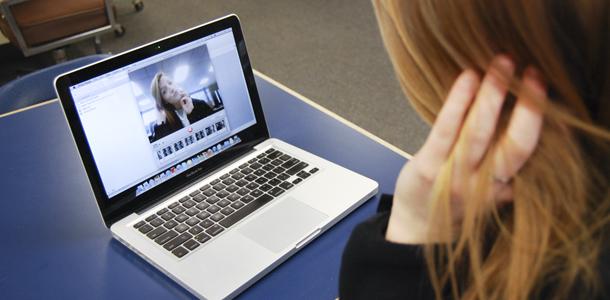Freshman Morgan Ray is currently bored out of her mind. According to Ray, she pulls good grades so easily in her classes, that it becomes easy to become distracted. While her teacher has students on their laptops taking notes, her cursor starts to wander. It pulls her off task and pushes her onto a far more engaging game of Tetris.
A faculty and administration meeting held on Dec. 15 discussed and considered what many students like Ray are facing: computer distractions.
According to Principal Paul Barker, the meeting was brought about through “the general unhappiness of the faculty about students who disrespect them by playing games…when they should be focused on the class,” Barker said.
“It’s [laptop usage] a problem for the less motivated students. It’s equivalent to sleeping in class. I know when you’re not paying attention, [and] I don’t think there is anything new we will come up to solve the problem, we just have to enforce the rules. We can’t sacrifice an entire tablet program for 20 students. We have to teach them how to use them properly,” history teacher Brian Powell said.
“It depends on how you [the students] use them. If you’re in class sitting there playing games, it’s bad. But if you use them in class for just academic stuff, it’s good,” freshman Matt Wagner said.”They are a little distracting, but we need to take so many notes [in class]. It would be impossible to keep them [notes] organized,” junior Alex Burdeshaw said.
The issue of computer distraction was not the only topic of discussion at the meeting. “Kids are taking screenshots of online tests and texting or communicating in some way about the content of tests and so on,” Barker said.
Teachers presented different solutions to the issues, one of them being that students be required to use their laptops strictly in tablet mode. If a stylus is not available to use, that student will have to take notes on paper, transfer them onto the tablet, and then present it to the teacher the next day.
“One of the outcomes was certainly [that] we need to talk to students about this issue and how we are to respond to it . . . It’s a matter of teaching students what responsible behavior is,” Barker said.
According to Barker, other solutions that were brought up were to limit computer usage to assignments done outside of school and homework, obtaining “policing software,” or to inflict “severe punishments” on those students caught off task on their tablets.
The software “SynchronEyes,” which allows teachers to monitor their students’ screens, is no longer up to date, according to Barker. “The license we have needs updating and we’re not sure whether we want to use the money [to do so]. It wasn’t getting a lot of use when we did have a current version two or three years ago. In these times where every resource is precious, we don’t want to invest in something four or five people will use,” Barker said.
Despite the drawbacks discussed at the meeting, Barker is firm in seeing the tablet program stay. “The technology is here to stay and shutting it out is not the solution,” Barker said. “The fact is, we are better and faster connected than we were four or five years ago,” Barker said.
Grace Kim can be reached for comment at gkim@jcpatriot.com.



